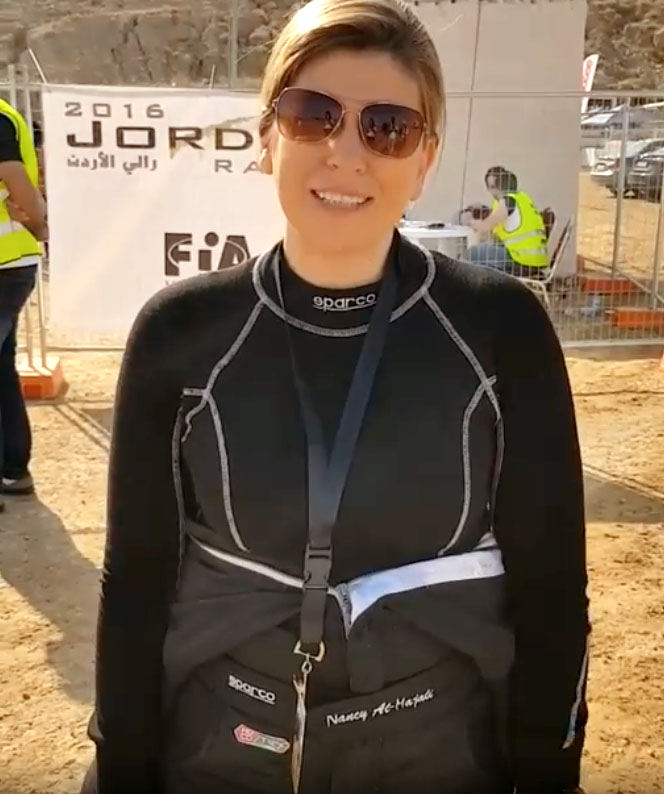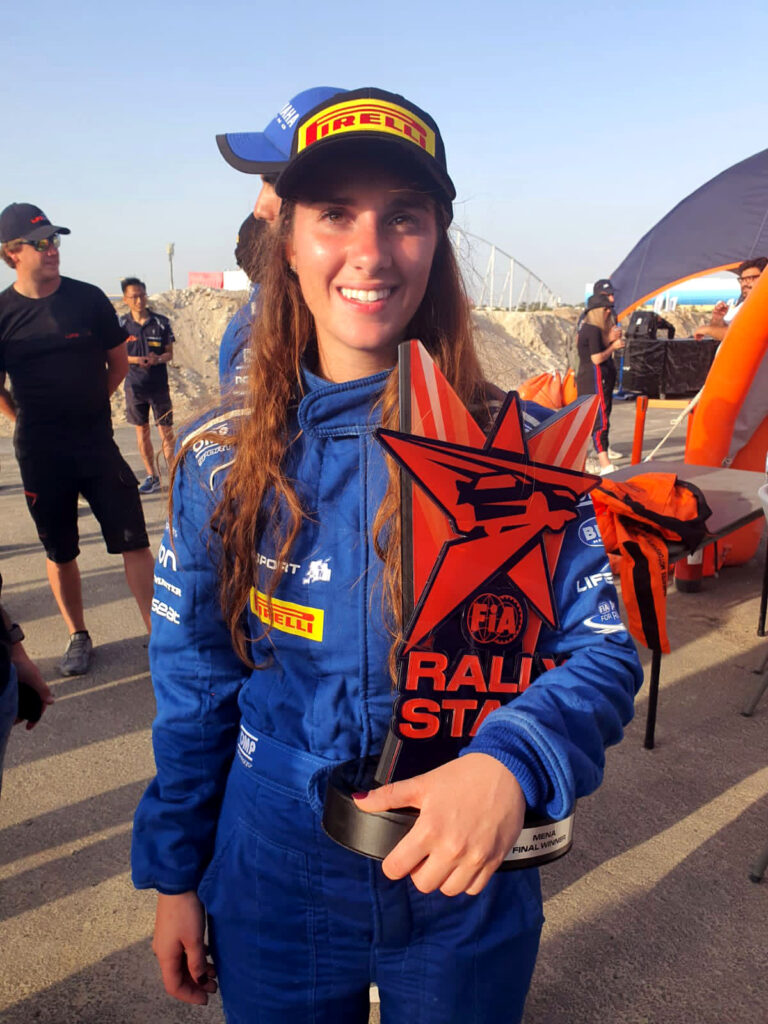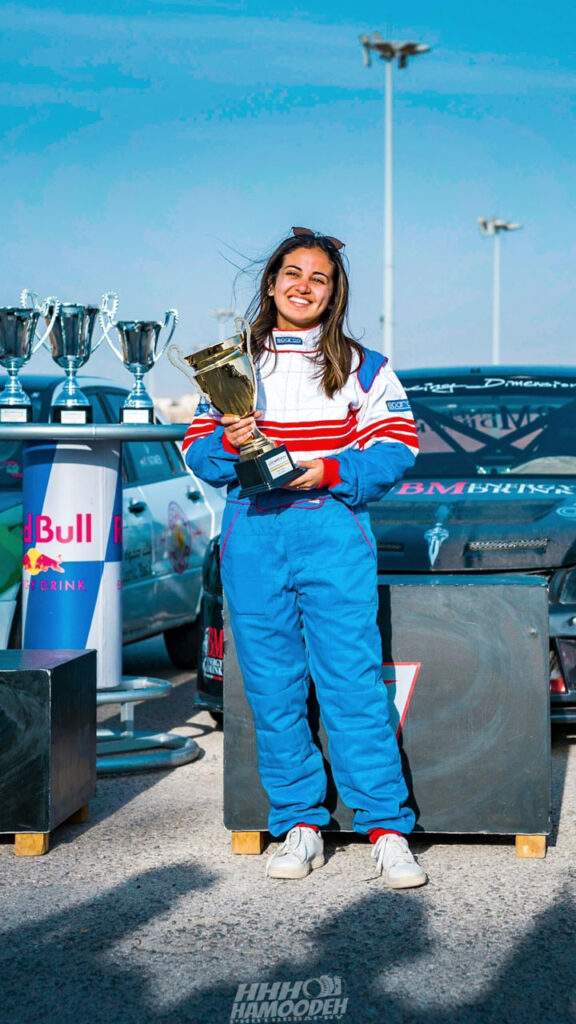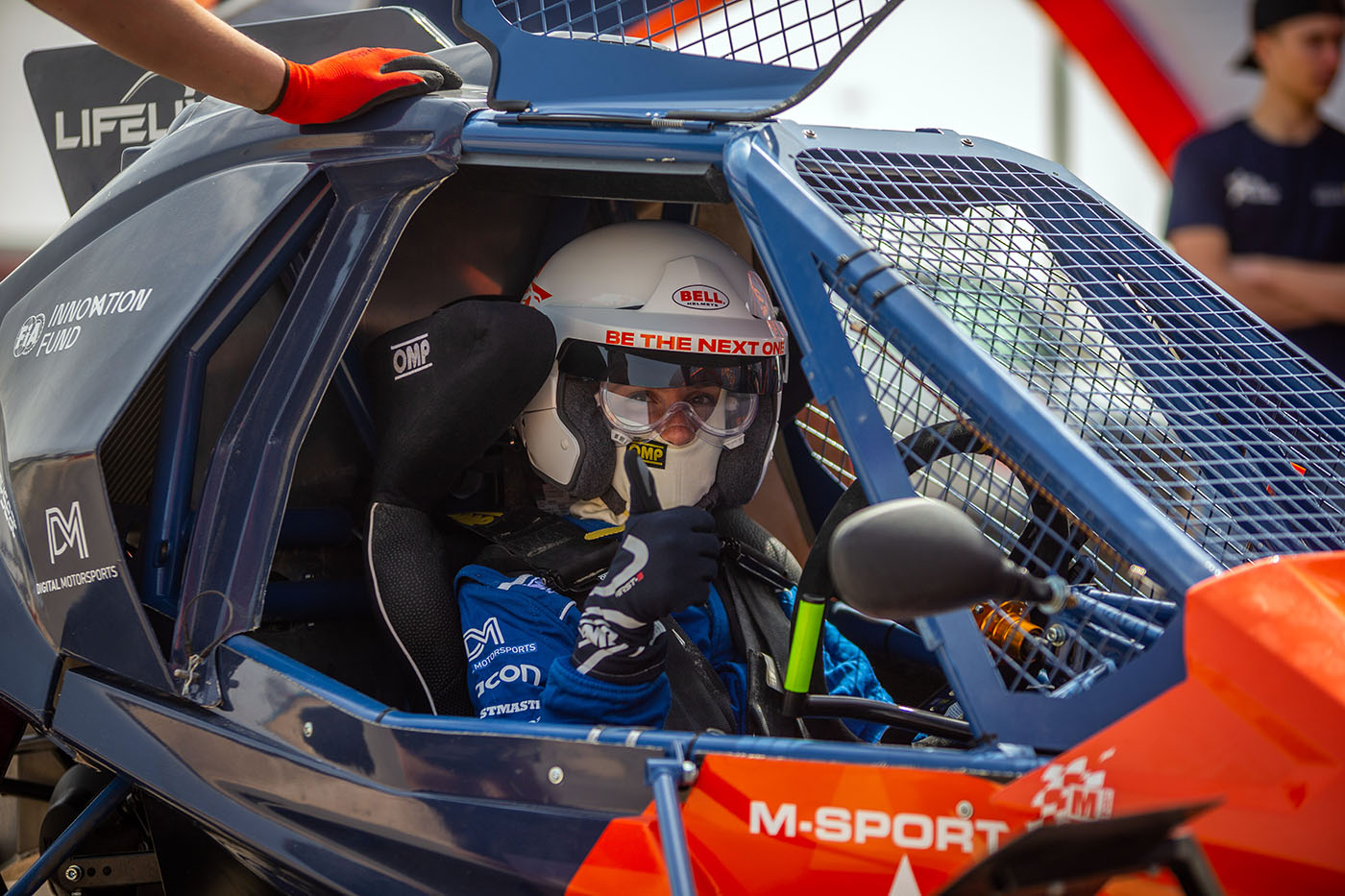Women race car drivers turn up the heat on the track as they compete with the men who dominate the sport.
Reem Halasa
She’s wired for speed; she’s born for the open road, whether on a motorbike or in a race car. If it has a revving engine, you’ve got Nancy Majali’s full attention. Nancy is one of the few Jordanian women who has made a name for herself in motorsports in the Arab world, but unlike those who have lost momentum, she has kept her passion alive for over two decades.
In 2000, Nancy bought her first “race-worthy” car and teamed up with her friend Nadia Shnoudeh, creating the first female racing team in Jordan. They started strong, taking part in their first national and international Jordan rallies organized by Jordan Motorsports that same year.
“I loved cars ever since I was a child, and you’d see me taking things apart and putting them back together,” Nancy says. One of five sisters, Nancy was the oddball in her family, but her parents were accepting and supportive of her racing dreams, as long as she didn’t track mud or grease in the house. “My mom would have me leave any remnants of the race in the basement, even my victory cups,” she recalls.
Women in the Middle East had started making headlines in the male-dominated sport, but it was Jordanian women who had taken to the track first, inspiring and mentoring other women in the region. As well as Nancy Majali, another of these Jordanian role models was Abir Batikhi, who was the first Arab woman to participate in the Fédération Internationale de l’Automobile (FIA) World Rally Championship, in 2008. Batikhi later inspired her own daughter, Lina Hadidi, to start rallying while she was still a student.

At the start of the 2000s, Nancy and her co-driver Nadia were enjoying the thrill of racing in what she affectionately calls “adventures.” They came across a lot of challenges and had to be resourceful to pursue their passion. “It was difficult at times to obtain the right gear and find parts for my car,” says Nancy. In a culture where mechanics are generally all men, it’s not socially acceptable or common to see women in workshops discussing sparkplugs and oil leaks. But car-racing had Nancy and other female racers of her time boldly treading Amman’s industrial district, building reliable and supportive contacts.
In 2009, Nancy stepped out of the lead driver’s seat. But she didn’t stray far, becoming a co-driver for champion drivers over the years. Being a co-driver is more challenging, Nancy explains; it takes focus, quick thinking, and a calm demeanor.
In 2011, Nancy was briefly back in the lead driver’s seat, participating in the FIA Middle East Rally Championships (MERC), where she ranked 10th out 12 in the drivers’ classification, the only woman on the list. After a decade out of the racing seat, Nancy made her comeback in the National Jordan Rally in April this year. She and her co-driver were the only female team participating. They finished the race ranking 11th out of 17 other drivers.
Any racer will tell you that motorsports are a notorious money pit, with unexpected expenses creeping in at every corner, throwing off a racer’s budget. Nancy says she poured every last penny she made into her passion. This is a common theme among racers, especially in Jordan, where even champion racers need other jobs to support their expensive passion project. Nancy reckons this is the reason many women and men with great talent lose their momentum and give up on racing.
Whether you’re a man or a woman, finding sponsorship is crucial for any racer, but since motorsports in Jordan haven’t attracted a huge following or media attention, possible sponsors remain skeptical about investing time and funds.

There is a wealth of potential and talent among young Jordanians, and “it would be a shame if we miss out because of financial obstacles,” Nancy laments. Some of these new talents are young women who grew up on the sidelines of the racetracks and were drawn to the adrenaline rush. One of them is Farah Zakaria, daughter of race car driver Khaled Zakaria, who won a series of victories as a driver and co-driver to the Emirati champion and now FIA President, Mohammad Ben Sulayem.
Farah says her father was her inspiration and biggest supporter on her journey. “I am proud that I am continuing in my father’s footsteps.” she says. “My proudest moment in racing is seeing him in the audience with a hint of a smile, and I know that he’s proud of me.”
Farah was go-karting from a very young age with her sisters, proving that racing was in their blood. Not one to shy away from the public eye, she performed a solo karting demonstration, an event aimed at attracting children to karting. The show was a success; shortly thereafter, in 2007, Jordan Motorsports held the first Juniors Karting Championship. Farah won the championship and has been competing ever since.
For Farah, the year 2022 became a turning point in her racing journey, as she competed in her first National Speed Test. “I didn’t have time to get a sponsorship, so I took my own car [an e-Golf electric] and I only completed three out five races,” she says. This competition was a practice run before she would compete in the FIA Rally Star program, an international program that sets the winners on track to the World Rally Championship (WRC). She won the local and regional race and qualified as a regional representative in the Women’s Finals, which will be held at the Maggiora Offroad Arena in Piemont, Turin in May.
As a race car driver, Farah commits herself to a fitness schedule that includes weight training and cardio fitness to maintain her health and stamina. Every morning, before she heads out to work, she goes to the gym. “Car-racing requires fitness and stamina,” she explains, as drivers are exposed to varying g-forces at high speeds and sudden turns and jumps, which takes a toll on their body and their ability to control the car.
It’s a sport of endurance regardless of gender, Nancy notes, especially in rallies with notoriously lengthy stages, during which drivers are exposed to hot conditions inside the car under layers of fire-proof and crash-proof gear.
At the time of this interview, Farah was preparing for the Women’s finals of Rally Star. The stakes are high and; if she wins, she will be one of six drivers in the FIA Rally Training Season between June and November; competing in six European rally events both on gravel and tarmac in identical Ford Fiesta Rally 3S. At the end of the season, the four best performing drivers will secure a fully-funded season in the FIA Junior WRC Championships in 2024.
Farah explains that it’s a tough competition and covers a lot of criteria beyond driving fast; the contestants’ fitness, media presence, and communication skills will be scrutinized.
As she continues to grow as a racer, Farah sets milestones for herself on the road to turning professional, including competing in speed tests as often as she can, so that she gets more practice behind the wheel; putting more time and effort into getting the right sponsorship; and upgrading to a professional-level racing car.
Farah is not only a talented racer, but also a skilled navigator and mechanic. She learned from her father that she has to take care of her own car and be able to fix certain problems on the spot. She says: “A good driver is also a good mechanic. You should be able to troubleshoot some issues on the track and listen to car noises before something disastrous actually happens and pulls you out of the race.”

Another young woman making her debut as a racer is Mira Tarazi. She started karting when she was 16, and when she got her driving license, she tried racing on dirt roads before competing in her first national speed test in her Hyundai Tuscani. “My car has its limitations as a road car,” she says, “but I am hooked on racing now.”
Like Farah, Mira is following in her father’s footsteps. She learned from experience and watching her dad, Basem Tarazi, a racer turned scrutineer — an inspector who checks race cars before they hit the track. “I would join him at races and watch him closely,” she says. When Mira turned 18, she became a volunteer scrutineer at national racing events before participating as a driver herself.
This practical experience inspired her to pursue a degree in automotive engineering, which she will complete this year as the first woman in Jordan to do so. “I love modifying and tuning cars for racing, so I am hoping to pursue a career in that, as well as racing,” Mira says.
Last year, Mira participated in every national speed test event organized by Jordan Motorsports, and when the opportunity arose, she entered her first rally event as a co-driver, adding to her experience and skillset. “It was a great experience, but unfortunately we had to retire due to a technical issue that we couldn’t fix on track,” she says.
Mira finished strong in 2022, taking home the Women’s Cup. “It was a proud moment for me and a great achievement,” she says.
Jordan is a pioneer in motorsports, with a 60-year heritage of hosting racing championships both national and international. The country’s diversity of terrain — from desert tracks to rocky hills and winding steep roads — makes it appealing and challenging for racers.
The late King Hussein, a speed aficionado, introduced motorsports in Jordan in 1954, and oversaw the creation of the Royal Automobile Club — a hub for motorists and racing. King Hussein was among the many racers competing on the track, winning his share of the competitions. In 1981, the country hosted its first international rally, and soon thereafter women started to trickle into auto racing.
It was a fun experience, recalls Randa Nabulsi, who adds that she and her peers were not aware of cultural limitations or the fact that they might raise a few eyebrows. Nabulsi was among the pioneering women on the racetrack. She remembers scrambling to find a good racing car for her first event. She eventually borrowed a Lada Niva, which turned out to belong to a man who used it to transport monkeys in town.
Over the years, Randa has seen the sport go from “racing for thrills” to a serious competitive sport. “I remember when other drivers would stop mid-race to help us women fix a malfunction or change a tire, something you definitely shouldn’t be doing in a race, especially nowadays.”
Today, Randa is a member of the FIA’s Women in Motorsports Commission. She remains devoted to drumming up support for women in auto racing, and encouraging parents of young girls who show interest in karting to support their enthusiasm along the way. These women and many others around the Middle East shine a light on racing as they break their own glass ceilings and achieve their victories in a male-dominated sport. These role models show young girls everywhere what is possible when you go after your dreams with great passion and enthusiasm.




